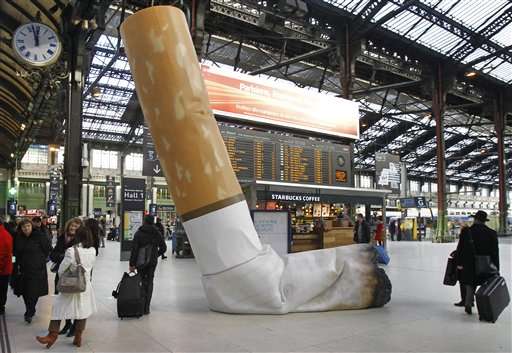In this Dec.4, 2012 file photo, a sculpture of a cigarette butt is set up inside Gare de Lyon railway station, in Paris. Too-thin models, too much drinking, sexy cigarette packs—France's Parliament is cracking down on all of this in a sweeping law designed to trim public health costs, and is tackling unhealthy stereotypes along the way. (AP Photo/Remy de la Mauviniere, File)
Too-thin models, too much drinking, sexy cigarette packs: France's parliament is cracking down on all of these in a sweeping bill designed to improve public health and trim public health costs—while tackling unhealthy stereotypes along the way.
The National Assembly, parliament's lower house, voted 311-241 on Tuesday to approve the draft law. It now goes to the Senate before a final vote back in the assembly. The Socialist-led government hopes the bill will take effect by the summer.
Health Minister Marisol Touraine, the bill's champion, said it is "crucial to tackle the challenge of aging and the emergence of new diseases" while preserving France's generous and highly vaunted health care system.
Here's a look at some of the key reforms:
ANOREXIC MODELS
In a measure that could cause ripples in France's famed fashion industry, the bill would make it a crime to use anorexic models or encourage anorexia.
It would forbid anyone with a body mass index, or BMI, below a certain level from earning money as a model. The exact level—based on height and weight—would be defined later by decree if the bill becomes law.
Any modeling agency or individual who pays a model with a BMI below the designated level would face up to six months in prison and 75,000 euros ($80,000) in fines if convicted.
Some 40,000 people are estimated to have anorexia in France—90 percent of them women, according to the Health Ministry.
PLAIN CIGARETTE PACKS
The government's plan includes a measure that would require manufacturers to package cigarettes in plain containers by May 2016. Packs would have the same shape, size, color and typeset. Brands would still be mentioned, but would be restricted to a small discreet place on the packaging.
The government believes less attractive packaging would help discourage young people from starting to smoke. Around 30 percent of French people smoke—a habit linked to some 73,000 deaths a year in France, according to official statistics.
UNDERAGE DRINKING
People who encourage minors to drink excessively could face a year behind bars and a $16,000 (15,000 euro) fine.
The sale to minors of products inciting people to get drunk, such as T-shirts, would be forbidden.
Touraine, the health minister, has cautioned against the ills of binge-drinking, and has used the English-language term to describe the act of excessive imbibing over a short period of time.
As many as 49,000 people die every year in France from the consequences of drinking alcohol, according to a 2013 study published in the European Journal of Public Health.
Other measures, including requiring the labeling of alcohol-related risks in advertising, were scrapped during the Assembly debate, under pressure from the conservative opposition and France's influential wine lobby.
CHILD OBESITY
In a step that would require changes to the business model of some fast-food chains, the bill would ban free-refill soda fountains in restaurants in a move aimed at combatting obesity.
Touraine, speaking in parliament, noted that the free-refill policy was "common in other countries, ... is spreading in our country and could be attractive to young people."
SUN-BED BAN FOR MINORS
Amid concerns about skin cancer, the bill would bar tanning salons from selling sun-bed services to customers under 18 years old or to engage in advertising targeting minors.
FACILITIES FOR DRUG USERS
The bill would allow for a six-year test period in which intravenous drug users would be given access to clean needles under medical supervision and in the presence of drug counselors.
The conservative opposition—which controls the Senate—has criticized the measure as a "very bad signal" to French youth, saying it trivializes the use of drugs.
Under France's legislative system, the National Assembly has final say in the passage of laws—so even if the Senate alters or rejects the bill, it could become law.
© 2015 The Associated Press. All rights reserved.


















